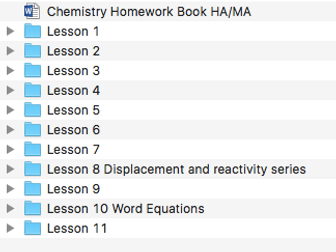KS3 Chemistry ,Reactions, Energetics and Materials - Full Term 11 Lessons, presentations and work
<p>11 Lessons covering the KS3 Chemistry Reactions, Energetics, and Materials Component<br />
Learning objectives whole powerpoints and differentiated activities and work included.<br />
Homework Booklet also included.</p>
<p>Higher ability, Middle and Lower differentiated thoughout.</p>
<p>Covers:<br />
<strong>Chemical reactions</strong><br />
chemical reactions as the rearrangement of atoms<br />
representing chemical reactions using formulae and using equations<br />
combustion, thermal decomposition, oxidation and displacement reactions defining acids and alkalis in terms of neutralisation reactions<br />
the pH scale for measuring acidity/alkalinity; and indicators<br />
<strong>Energetics</strong><br />
energy changes on changes of state (qualitative)<br />
exothermic and endothermic chemical reactions (qualitative).</p>
<p><strong>Materials</strong><br />
properties of ceramics, polymers and composites (qualitative)<br />
the order of metals and carbon in the reactivity series.</p>
<p>Lesson 1: Introduction to Chemical Reactions<br />
Lesson 2: Safety in experiments and Scientific Equipment<br />
Lesson 3:How to observe and record chemical reactions.<br />
Lesson 4: Indicators and the pH scale experiments.<br />
Lesson 5: Endothermic and Exothermic reactions.<br />
Lesson 6: Neutralisation<br />
Lesson 7. Combustion<br />
Lesson 8. Displacement and the reactivity series - with higher word equation activities.<br />
Lesson 9. Thermal Decomposition / with added SEN lesson for those working below lower ability.<br />
Lesson 10. Word Equartions<br />
Lesson 11. New materials - properties of polymers and composites.</p>
